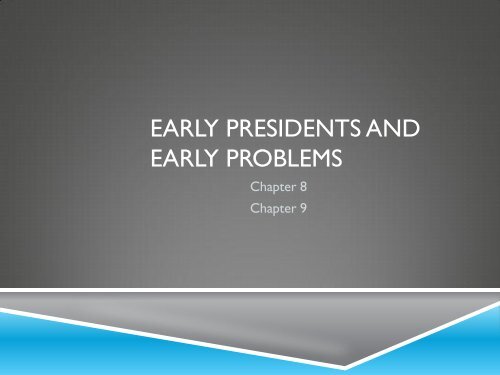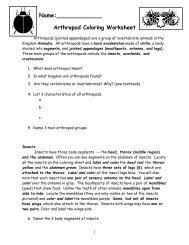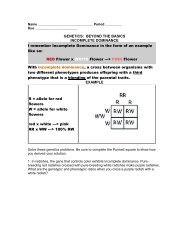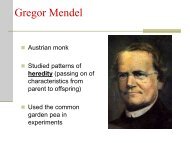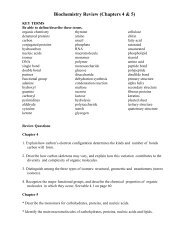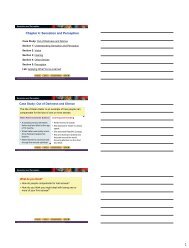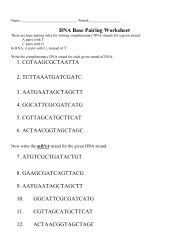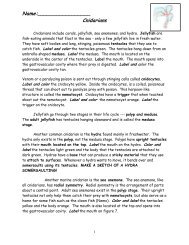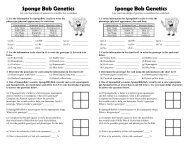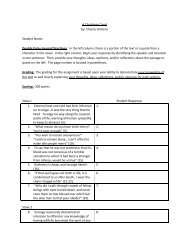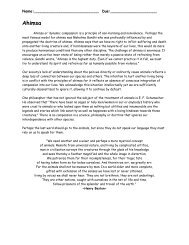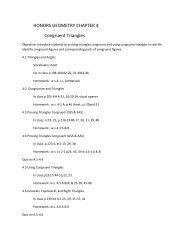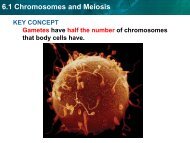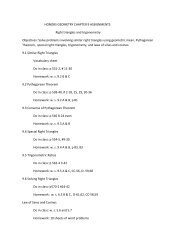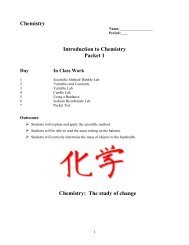Early Presidents and Early Problems
Early Presidents and Early Problems
Early Presidents and Early Problems
Create successful ePaper yourself
Turn your PDF publications into a flip-book with our unique Google optimized e-Paper software.
EARLY PRESIDENTS AND<br />
EARLY PROBLEMS<br />
Chapter 8<br />
Chapter 9
KEY TERMS<br />
Precedents = Traditions<br />
Cabinet = mentors to the President on specific<br />
issues<br />
Impressment = forcing people in to the military<br />
Faction = political parties<br />
Implied powers = powers not expressly forbidden<br />
in the Constitution<br />
Laissez-faire = French philosophy meaning let the<br />
people choose
QUESTIONS TO PONDER<br />
What traditions to you have in your family?<br />
What traditions would you like to carry on when you have your own<br />
family?<br />
How did those traditions begin?<br />
How many of you have step-families that you live with?<br />
What was the adjustment like to moving in with them?<br />
Do you think there will be struggles with our new government?
PRESIDENT WASHINGTON’S DECISIONS<br />
John Adams = VP<br />
Called Mr. President (instead of His Highness the President of the<br />
US)<br />
Three depts. In the executive branch (Cabinet members)<br />
State Department = h<strong>and</strong>les relations with other nations<br />
(Thomas Jefferson)<br />
Treasury Department = dealt with financial matters<br />
(Alex<strong>and</strong>er Hamilton)<br />
War Department = provide for the nation’s defense (Henry<br />
Knox)<br />
President can fire his cabinet w/out Senate’s approval
FINANCIAL PROBLEMS – HAMILTON'S PLAN<br />
Hamilton wanted to pay the cost for the states for helping<br />
the war effort<br />
Problem: many people had sold their war bonds, so the<br />
speculators who bought them would be rich<br />
Problem: Southern states would have to pay more than<br />
their fair share<br />
Compromise =<br />
Capital would move closer to the South between the<br />
borders of Virginia <strong>and</strong> Maryl<strong>and</strong><br />
Southerners agreed to help pay off debt
WHISKEY REBELLION<br />
Hamilton imposed a tax on imports (tried to encourage<br />
purchase of American goods)<br />
Farmers in Western Penn upset when tax collectors came<br />
Armed rebellion began<br />
Washington called in the military to stop rebellion<br />
Result = people would have to peacefully protest (through<br />
Constitutional means)<br />
HOW DOES THIS DIFFER FROM SHAYS REBELLION?
PROBLEMS WITH EUROPE<br />
French Revolution began<br />
People take sides as to whether to help them in their fight for freedom<br />
Washington issued a Proclamation of Neutrality<br />
<br />
<br />
British began to capture American Merchant ships <strong>and</strong> forced people to fight for them<br />
Jay’s Treaty<br />
<br />
<br />
<br />
<br />
Relations with Spain<br />
British were removed from American soil<br />
Damage to ships was paid for<br />
American trade open to British colonies in the Caribbean<br />
Americans had to pay for debt to Britain from pre-1776<br />
Spain feared American involvement in Spanish Empire<br />
Pickney’s Treaty<br />
<br />
<br />
Allowed American navigation of Mississippi<br />
Right to trade in New Orleans
NEW PRESIDENT AND POLITICAL PARTIES<br />
Washington set precedent of two terms<br />
Discourage political parties fearing it would tear apart the nation<br />
Do you agree???
FEDERALISTS<br />
Now applied to the group of people who supported<br />
Washington’s admin.<br />
Strong federal govt.<br />
Admired Britain for its stability<br />
Rule by the wealthy class<br />
Loose interpretation of the Constitution<br />
Alex<strong>and</strong>er Hamilton <strong>and</strong> John Adams
REPUBLICANS (DEMOCRATIC-<br />
REPUBLICANS)<br />
In favor of limiting govt. power<br />
Supported the French<br />
Small farmers <strong>and</strong> merchants (mid-Atlantic <strong>and</strong> South)<br />
Strong state governments<br />
Rule by the people<br />
Strict interpretation of the Constitution<br />
Thomas Jefferson <strong>and</strong> James Madison
ELECTION OF 1796<br />
Federalists nominate John Adams (Charles Pickney for VP)<br />
Republicans nominate Jefferson (Aaron Burr for VP)<br />
Results<br />
Adams = 71 electoral votes<br />
Jefferson = 68<br />
Constitution states that the second highest # of votes<br />
becomes VP<br />
Federalist President Adams <strong>and</strong> Republicans VP Jefferson
ADAMS PRESIDENCY<br />
XYZ Affair<br />
Issue with France <strong>and</strong> secret agents<br />
Adams told Congress the US needed to prepare for war with the<br />
French<br />
Congress established a Navy Dept. And set aside $ for warships<br />
Increased the size of the army<br />
Americans/Pres Adams negotiated peace with France before anything<br />
happened<br />
Hurt Adams chance for re-election<br />
Federalists split – Thomas Jefferson will ease into the Presidency in<br />
1800
THOMAS JEFFERSON – OVERVIEW OF THE MAN


